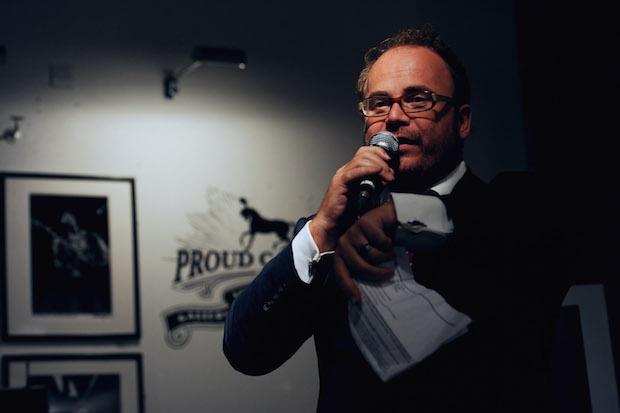I tend to avoid Camden these days as it makes me feel even more like Mark Corrigan than usual, so it’s been a few years since I visited the Proud Gallery. I seem to remember it was for some industry event and there was lots of free beer; it was a nice venue with a view overlooking the area, but I can’t recall whether the place was gay, super-gay or not-very-gay.
Someone else was obviously unaware of the bar’s sexual orientation, as they wrote an email to its owner, Alex Proud, enquiring because some of their staff might have religious objections. Mr Proud’s response was to tell them their booking was cancelled and to post the exchange on Twitter.
I feel that a great opportunity for comic awkwardness was lost here; picture a group of imams and nuns in one room, with the Blue Oyster Bar clientele next door and a stressed-out waiter trying to separate the two. This was the sort of setting for much of the comedy of my youth – think the Blackadder episode where Edmund has double-booked a piss-up and dinner with his Puritan relatives – and British humour to a certain extent reflected our political culture, namely English liberalism.
The basic principle of English liberalism, which grew out of parliamentary tradition, a free market in land and labour, and philosophers such as John Locke, was that people should try to engage with each other in the public square despite strongly held differences of belief. These differences were originally sectarian but they came to also encompass differences in political ideals or lifestyle choices. Our comedy is so often about people trying to awkwardly get along, despite their prejudices.
And one of the central tenets of that English liberalism was that people should still trade with those with whom they had profound disagreements; the Brendan Eich affair showed just how much the same-sex marriage campaign had broken this liberal principle, and it is for this reason that people hailing Mr Proud’s letter in triumphalistic fashion makes me uncomfortable.
Mr Proud works in the hospitality industry, and so as far as I’m concerned is well within his right to refuse customers if he feels they may make his existing ones uncomfortable. On the other hand potential customers are well within their rights to ask what kind of establishment they are attending, and to look after employees or clients who might not feel comfortable in gay bars, and who may just want to enjoy their Christmas lunch. (My advice is that if you’re quite socially conservative, avoid Camden generally, it might freak you out.)
Mr Proud says he doesn’t like Twitter witch-hunts and mobs, but they exist because a section of the population feel total moral righteousness about certain moral issues, namely sex ones; they also occur because people are now averse to personal opinions remaining private or discreet, as this only gets in the way of the mission to drive out bad thinkers from our society.
Mr Proud argued in the Telegraph that ‘I do believe we should do our best to be liberal and tolerant and call out those who aren’t’ and that ‘Part of being tolerant, though, is giving people a chance to change, rather than dragging their names through the online mud – and that is why I would never publish their details.’
But the whole point of liberalism is that you don’t ‘call out’ (ie denounce) people with whom you don’t agree, and part of being tolerant is accepting that people shouldn’t have to change because they think differently to you. Giving someone time to recant doesn’t make you a liberal.
Brendan O’Neill argued last week that gay marriage goes hand in hand with the erosion of freedom; certainly by making our views on homosexuality a new test act, people who call themselves liberal have removed the very core principle of liberalism. What would John Locke say? ‘Wow, just wow’ I imagine.







Comments